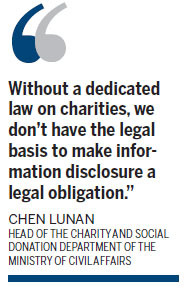Proposed Beijing law seeks data on charities
Updated: 2013-01-09 08:05
By He Dan (China Daily)
|
||||||||

Legislation mandates disclosure of philanthropic groups' fundraising
Beijing authorities have vowed to punish charity organizations that fail to disclose information as required, according to draft legislation.
The lack of a State-level law remains the biggest problem in efforts to promote transparency in the charity sector, a source from the country's top watchdog for charity organizations said on Tuesday.
The Regulations on Promoting the Development of Charity in Beijing state that charities that fail to disclose information will face a fine of up to 30,000 yuan ($4,800).
The draft states that it is mandatory for a philanthropic organization to disclose information under six categories, including the organization's basic information, fundraising and the inflow and outflow of donations. All new information should be released within 20 days, it states.
The municipal government will help set up a platform for charities to make their information public.
The draft regulations also state that the public can ask philanthropic organizations to release other information if this requirement is in line with the law.
The draft, released on the website of the legal affairs office of Beijing, is open for public opinion until Jan 20.
Chen Lunan, who heads the charity and social donation department of the Ministry of Civil Affairs, said governments, including those in Beijing and in Hunan and Guangdong provinces, have issued detailed regulations for disclosure of information by charity organizations after the ministry issued a guidance paper in late 2011.
"We encourage local governments to explore feasible ways for disclosure," he said. "Introducing penalty mechanisms will prompt charities to act."
He said his ministry has had many rounds of talks with the legislation department of the State Council but the State-level regulations on information disclosure have yet to come into force due to the lack of a higher-level law.
"Without a dedicated law on charities, we don't have the legal basis to make information disclosure a legal obligation," he said.
Liu Peifeng, a law expert at Beijing Normal University specializing in nonprofit organizations, said information disclosure plays an important role in triggering competition among charity organizations and allows those that are more transparent and efficient to survive.
"Disclosure also makes it possible for the government to supervise charities," he said.
China's philanthropic sector has been losing credibility and money from the public, and lack of transparency is believed to be a major reason.
According to the China Charity and Donation Information Center, donations and goods going to the charity sector fell by about 18 percent, from 103.2 billion yuan in 2010 to 84.5 billion yuan in 2011.
Cui Lanxin, secretary-general of the Beijing Chunmiao Save the Children Foundation, which helps orphaned and severely sick children, said her organization updates donation information daily and details of charitable projects monthly on its website.
"I'm concerned whether it's mandatory for us to release the information again on the unified platform," she said. "If so, is there any financial aid for us to cover the extra expense?"
Hang Yu, who is in charge of website maintenance for the China Social Welfare Foundation, a public foundation in Beijing, urged the government to increase financial and technical support for grassroots organizations in terms of disclosure.
"Our foundation has sponsored more than 10 grassroots organizations, and although we expected them to hand in project information regularly for our website, they often complained that they are short of hands to collect the information," he said.
hedan@chinadaily.com.cn
(China Daily 01/09/2013 page7)

 In Photos: 7.0-magnitude quake hits Sichuan
In Photos: 7.0-magnitude quake hits Sichuan
 Li Na on Time cover, makes influential 100 list
Li Na on Time cover, makes influential 100 list
 FBI releases photos of 2 Boston bombings suspects
FBI releases photos of 2 Boston bombings suspects
 World's wackiest hairstyles
World's wackiest hairstyles
 Sandstorms strike Northwest China
Sandstorms strike Northwest China
 Never-seen photos of Madonna on display
Never-seen photos of Madonna on display
 H7N9 outbreak linked to waterfowl migration
H7N9 outbreak linked to waterfowl migration
 Dozens feared dead in Texas plant blast
Dozens feared dead in Texas plant blast
Most Viewed
Editor's Picks

|

|

|

|

|

|
Today's Top News
Live report: 7.0-magnitude quake hits Sichuan, heavy casualties feared
Boston suspect cornered on boat
Cross-talk artist helps to spread the word
'Green' awareness levels drop in Beijing
Palace Museum spruces up
First couple on Time's list of most influential
H7N9 flu transmission studied
Trading channels 'need to broaden'
US Weekly

|

|







